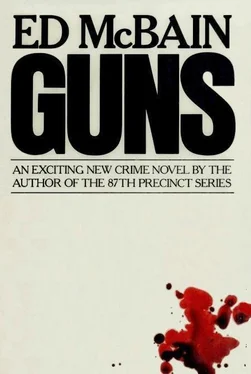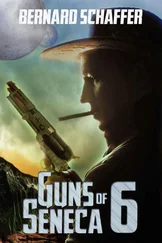“Excuse me,” the doctor says, and smiles. “Let’s take a look at that arm, shall we? This way, please.”
He follows the doctor through the waiting room and into an examination room. The office is part of a white clapboard house with a white picket fence. Somewhere in the house Colley can hear a baseball game on television. In the back yard there’s the sound of children lauging. The doctor watches him as he takes off the plaid jacket. The jacket is winter-weight and the sleeves are a little too long for Colley. He wonders if the doctor is noticing this. Sunlight slants through the curtained window. In a glass-fronted cabinet on the wall opposite, scalpels gleam.
“Would you sit up here, please?” the doctor says, and Colley gets onto the examination table. There is not much blood on the pillowcase he wrapped around his arm. The doctor removes it gingerly, and says “Mmm” when he sees the wound. There is blood caked all over the wound, it looks worse now than it did just after the dog quit gnawing on it. The doctor goes to a cabinet and takes a squeeze-bottle from it, and then wets a piece of gauze and gently soaps out the wound. As he works, it begins to look a little better. There is some fresh blood, but just a little, and he wipes this away and studies the tom flesh and the teeth marks on the arm where the skin has not been ripped.
“Where’d this happen?” the doctor asks.
“Down the road,” Colley says.
“Big dog?”
“Police dog,” Colley says, and then says, “German shepherd, a German shepherd.”
“Mmm,” the doctor says. “Where’s the dog now?”
“Dead,” Colley says. “I killed him.”
“Mmm,” the doctor says.
“Am I going to need stitches?”
“Not with this kind of injury,” the doctor says. “Animal bites, human bites, we leave the wound open. No sutures,” he says, and smiles suddenly, looking more like a tennis player than ever. “Don’t worry, Mr. Casatelli,” he says, getting the name right this time and patting Colley’s shoulder reassuringly.
He opens a drawer in the cabinet and searches among a clutter of drug samples, and comes up with a small tube. “This is just an antibiotic,” he says, and unscrews the black cap and squeezes the ointment onto a gauze bandage. He puts the bandage over the wound, and then takes out a roll of gauze and begins wrapping the arm.
Colley is beginning to feel better. He likes the way this doctor handles himself, and he also feels very comfortable here in the examination room, with sunlight slanting through the window and children laughing in the back yard and a baseball game going on television. It is like he is in a relative’s house. It is like he is a kid again, and he cut his finger visiting one of his relatives, and an uncle or somebody is taking care of it.
But as the doctor bandages the arm, he begins telling Colley about rabies, scaring him half to death. He tells Colley he does not wish to alarm him, and then he starts giving him the symptoms, starting with a pain in the scarred arm, the arm will have healed over by then. This will be about forty days from now, it takes about forty days for the virus to incubate, it is different with a face bite or a leg bite. Colley doesn’t want to hear it. He is beginning to sweat as the doctor tells him that if he has rabies, and he certainly doesn’t want to alarm Colley, why, then the symptoms will start with a pain in the scarred arm, and he’ll also have a headache, and he’ll feel generally lousy, and he won’t have any appetite, and there’ll be vomiting, and restlessness, and apprehension, and he’ll have difficulty swallowing. Later on there’ll be mucus in his mouth and he’ll be breathing hard and talking fast, and eventually he’ll go into convulsions at the slightest stimulus and will suffer delirium and maniacal attacks, until finally, on the third or fourth day of the acute phase, he’ll go into paralysis, coma, and finally death.
The doctor is finished bandaging the arm now. He goes to another drawer, the place is full of drawers, and he takes out a hypodermic and a vial. He pierces the top of the vial with the needle, fills the syringe, and says very briefly, “Tetanus toxoid.” He rubs a little cotton ball saturated with alcohol onto the biceps of Colley’s arm, and then gives him the shot so Colley can’t even feel it. Colley nods.
“Okay?” the doctor says.
“Yes, fine.”
“Is that cheek bothering you?”
“No, it’s... I bruised it when the dog attacked me.”
“I wish I knew if that dog were rabid,” the doctor says, getting back to the goddamn gruesome subject of rabies.
“He wasn’t foaming at the mouth or anything,” Colley says.
“Where’d you leave him?”
He can’t tell the doctor he left the dog in the woods because then the doctor will want to know what he was doing in the woods and which woods and so on. “By the side of the road,” he says. “I got out of the truck to stretch a bit and the dog attacked me.”
“Side of the road where?” the doctor says.
“Few miles from here.”
“Because if he’s licensed, he’ll have had his rabies shot, you see.”
“Yeah,” Colley says.
“If I were you, I’d call the police...”
“Well, I’m just passing through...”
“Because even if the dog isn’t licensed, once they find him they can cut off the head and test the brain.”
“Well, I don’t think he had rabies,” Colley says. “He wasn’t foaming.”
“It’s up to you,” the doctor says. “But I’d call the police if I were you. It’d be worth the peace of mind. Rabies is not a pleasant disease.”
“Well, thank you, maybe I will,” Colley says.
“Or I can phone for you, if you like.”
“That’d be fine,” Colley says. “I’d appreciate that.”
“A few miles up the road, you said? Was that north or south?”
“South,” Colley says.
“If the dog should prove to be rabid, how can I reach you?”
“I’m at 1217 Kruger Avenue,” Colley says. “In the Bronx.”
“1217 Kruger,” the doctor says, writing.
“Yes,” Colley says. He knows there is a Kruger Avenue in the Bronx, but he has never been there. He suddenly realizes that he has given the doctor the name of the man who made his life miserable in prison. Kruger. The Kraut.
“How much is that, Doctor?” Colley asks.
“Twenty-five dollars,” the doctor says.
Colley pays him, and shakes hands with him, and leaves the office.
Behind him, he can hear the doctor’s children playing in the back yard.
He is sure he has rabies.
As he drives the pickup north, he begins to imagine he has all the symptoms the doctor talked about. He begins to believe that his hyped-up, slowed-down condition is a result of the dog biting him. He cannot remember feeling this way before the dog rushed out of the woods and bit him, this feeling of running in place though he is running forward as fast as he can, this sense of impending doom. Apprehension is what the doctor called it. Restlessness and apprehension. He does not remember that this all began the moment Jeanine pulled the red Pinto into the parking lot in front of the diner. The holdup seems centuries ago. He is centuries old and he has rabies and he will go into convulsions at the slightest stimulus and suffer delirium and maniacal attacks. If there is any way he does not want to die, it is from rabies. If he has any choice in the matter, he will choose even death by drowning over rabies. Rabies has got to be the dumbest way in the world to die.
He is suddenly ravenously hungry. The hunger attacks him like another pain, he thinks at first it may be a symptom the doctor forgot to mention. Except for the lecture on rabies, he likes the way that doctor handled himself. He admires professionalism, and the doctor was a real pro. Things were different, these were different times, they’d probably go out and play a few games of tennis together, have a beer afterwards. Jesus, he is starving hungry, he wants a hamburger and a cold beer. He begins looking for a place to eat, but all he can find is a drugstore in a roadside shopping center, with signs in the window advertising specials like eggs with bacon, toast and coffee for 99¢. This is Sunday, he hopes the lunch counter is open. The way he feels, he is going to eat the gear shift if he doesn’t get some real food soon.
Читать дальше










